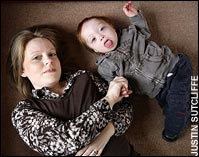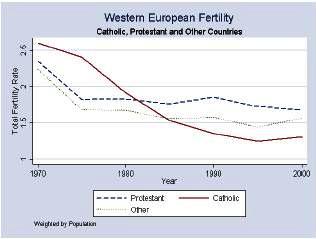In a post heard round the world (or at least around the small world of Catholic/Conservative blogdom) Rod Dreher has announced that he is struggling with the question of whether to convert to Eastern Orthodoxy -- in great part because (quoting with approval a friend of his who converted to Orthodoxy):
Over and over again, I have seen the magnificent teaching and witness of John Paul II and the Catholic tradition undermined and even rejected at the parish level. I honestly don't know if I could keep my kids Catholic in the American church -- or even Christian.
Having run into Rod in the comments sections of various Catholic blogs over the last few years, there's a sense in which I simply find myself thinking, "Well, that's not much of a surprise." As a result of covering the sex abuse scandals, Rod has become incredibly (one might almost say insanely) bitter about the institutional Church. And this, he says, has led to his main motivation for considering leaving the Church:
What moved us to consider Orthodoxy? It's a long story, but to cut to the chase, there were two things. The most acute was complete burnout over the Catholic sex-abuse scandal. I have always kept squarely in front of me the crucial point made by Father Andrew Greeley, who said that even if the Catholic church was run by psychopathic tyrants, that has nothing whatever to do with whether or not the Catholic faith is true. He is correct. That insight kept me solidly Catholic despite all the horrible things I was learning about church corruption and abuse of children. Nevertheless, the constant fear and anger I couldn't shake off began to eat away at me. Without my realizing it, my faith had become a cerebral thing.... Is it possible to live an authentic life of faith based only on cerebrality, on intellectual/doctrinal conviction? And if not, what do you do on Sunday morning?
What Rod chooses to do is very much a matter between him, his eternal soul, and God. To loosely paraphrase Man For All Seasons, when you hold your eternal soul in your hands, you should be pretty careful not to let it slip through your fingers. But his description of his dilemma brought to mind several things.
The Road Not Taken
There are a number of real and important differences between Catholicism and Orthodox (petrine supremacy being one of the most important, it seems to me) but there is a certain sense in which modern Eastern Orthodoxy (both in its strengths and weaknesses) shows us something of where Roman Catholicism might have headed without Vatican II. The ancient splendor of the EO liturgy remains virtually unchanged over the last few hundred years. Countries with majority Orthodox populations have seen church attendence and belief plummet, but at the same time a new wave of dynamism have arisen from a tide of converts and cradle Orthodox rediscovering their faiths.
In some ways, the Roman Catholic bishops saw a similar world approaching when Vatican II convened. Belief and church attendence were already falling in countries like France, Italy and Spain in the 60s, although the 20th century had seen a number of intellectual converts and a theological and liturgical re-awakening that gave many great hope for the future. The fathers of the council hoped that by re-presenting the teachings of the Church to the modern world, they could stem the tide of un-belief.
In this sense, the experience of the Orthodox perhaps suggests that the collapse in belief and practice by Catholics around the world over the last forty years cannot simply be laid on Vatican II's doorstep. Rising prosperity and the triumph of the ideal of a pluralistic society has reduced the incentive for unbelieving Catholics to go through the motions. And the increased material comfort in our lives and the comparative low profile of suffering and death have made it easier to believe that "this is all there is -- and it's pretty good at that."
But given that with or without at Vatican II, the late 20th century was probably doomed to see a massive falling away from the faith, what was the advantage of the council? Or was it an unmitigated ill?
I think the Vatican II documents themselves did indeed achieve their objective of clarifying and representing the ancient faith to the modern world. And yet, the mere fact that there was a reform movement going on within the Church during the late sixties and early seventies opened the door to a torrent of abuses, the results of which we live with today. If there had been no Vatican II, there would have been no convenient hook to hang all the claims that rode under the 'Spirit of Vatican II' banner on -- and so I think it's true that we would have seen less chaos in Catholic liturgy and school rooms.
What would, I think, have happened, is that people would have increasingly seen Catholic belief and practice as a charming and old-fashioned window dressing to apply to major life events such as weddings and funerals, but not something that understood in any sense the modern world. The mass would have remained relatively stable, though perhaps over the last forty years changes would gradually have built up until we ended up with something rather like the 1965 Missal: Readings in the vernacular, but everything else in Latin, a few accretions such as the final gospel stripped away, but otherwise very much the same mass as was in the 1962 Missal which is currently considered 'traditional'.
We certainly wouldn't have seen the mass exodus of priests and nuns from the religious life had there been no Vatican II, but I think we would probably have seen vocations fall off rather steeply. And although we wouldn't have had some of the idiocy that passed for seminary formation in the 70s and 80s, we would probably have seen a continuation and perhaps even a worsening of the excessive mediocrity which plagued some seminaries in the 50s and early 60s, with seminarians reading second and third-hand schoolboy Latin summaries of what the Doctors and Fathers of the Church wrote rather than reading the true depth and breadth of our Catholic heritage. (
Raymond Hedin, an ex-Catholic seminary drop-out, describes the pre-Vatican II education he received at the Diocese of Cleveland seminary in Married To The Church, a book which makes it rather easier to understand who the priests ordained before Vatican II could have gone so far wrong, so quickly after the council.)
We would have been spared the excesses of the Sr. Chitisters and Fr. McBrians of the world, but we probably would see today a great deal more strife and uncertainty between those trying to be orthodox. On the topic of religious freedom, there was strong and genuine disagreement between loyal Catholics before Vatican II as to whether the ideas put forth by John Courtney Murray (or, come to that, Karol Wojtyla) in the early 1960s were heretical. There was also real disagreement as to whether Wojtyla's ideas about human sexuality and the language of the body (as expressed in the 1960 Love & Responsibility) were indeed a sound explication of Catholic teaching on sexuality, or instead a dangerously 'modernist' approach -- utilizing as it did elements of phenomenology and personalist philosophy. In a Catholicism without Vatican II, it would be rather less clear whether Ratzinger and Wojtyla or Bishop Williamson represented a truer vision of Catholicism.
The Dangers of Excessive EcumenismThere's been a great deal of emphasis on the hope of reunion with the various Orthodox churches in recent years, and certainly, we must all as Christians hope for the day in which the Great Schism will be healed. And yet, some of the more excessive statements one hears in connection with the ecumenical effort come far too close to indifferentism. While it is true that the Catholic Church regards the Orthodox churches as possessing valid sacraments and apostolic success, and as being in schism rather than heresy, this does not mean it is a mere matter of preference to leave Catholicism for Orthodoxy. After all, the SSPX has apostolic succession and valid sacraments, yet I would hope any good Catholic parent would be much concerned if his or her child left the Church for the SSPX.
The difficulty is further exacerbated in that while we consider the Orthodox to have valid sacraments and non-heretical (though not as developed) theology, many among the Orthodox do not consider Catholic sacraments to be valid, and consider Catholic doctrine to be heretical. Essentially, Catholics consider the Orthodox not to be heretics for the same reason that we do not consider Aquinas to be a heretic -- one can hardly expect the Angelic Doctor to have affirmed beliefs that were not definatively taught by the Church when he lived. And similarly, the Orthodox can hardly be expected to affirm doctrines that have been defined since the schism.
However, if someone who was previously a professed Roman Catholic leaves Catholicism for Orthodoxy, he is thus clearly rejecting Catholic doctrine, and so he
is a heretic, even if someone born into Orthodoxy is not.
There Is No City of God on EarthBy his own description, one of the reasons why Dreher is currently finding it so hard to be Catholic is that initially, after his conversion, he expected so very, very much of it. It's tempting to think that Catholicism, or some little portion of it, is very near to perfect. And seeing as the institution Church is made up of humans, it clearly isn't.
Perhaps it's easier to see this as both a cradle Catholic and a student of history, but it's always seemed to me that the proof of God's divine guidance is not that the Church is so sinless, but rather that she has remained wholly true to the deposit of faith despite being populated and occasionally run by some exceedingly sinful people.
This isn't just something to keep in mind for generalities, however. There's also a danger in investing too much of one's belief in specific individuals and institutions. I always wonder a little when people gush about "I've never known such a holy priest. He really sums up for me the ideal of what the priesthood should be." I've been blessed to know some great priests, and may well even have one in the family eventually, as MrsDarwin's brother is currently in seminary. But people, no matter how good, are people -- not ideals. It's usually not good either for us or the object of our respect to think of someone as an ideal, whether it's the ideal priest, the ideal mother, the ideal business man or the ideal politician.
It Takes a Family -- Not a ParishI grew up in Los Angeles Archdiocese, in two rather mediocre parishes. My wife went to CCD in the Diocese of Richmond, before moving to somewhat safer ground in Cincinnati. In both our cases, we have our families to thank for the fact that we were given a good education in the Catholic faith, not our parishes, schools or diocese. But even if we'd grown up in one of the conservative Catholic meccas like the Diocese of Lincoln, it's still our families that we'd primarily have to thank. Having a great, solid parish can certainly help, but children are formed in the home, not the parish. (Goodness knows, if the sudden collapse of our apparently solid catechesis after Vatican II taught us anything, it's that you cannot simply assume that exposing children to good liturgy and good nuns will automatically make them knowledgable and fervent Catholics.)
Nor need living in a run-of-the-mill suburban parish in the United States necessarily be a life of constant war and suffering for a good Catholic family. To be sure, it's harder than it ought to be. You may need to examine several different local churches to find a 'don't add anything' priest. But one must also decide what's worth hating and fighting over, and what's not. I wish we had a Novus Ordo (or indult) Latin mass at our parish. I wish we had a real organ. I wish we didn't occasionally sing Amazing Grace or southern spirituals. But at the same time, I know I need to keep in mind that the parish we found and settled in is in most essentials a good parish, and getting better rather than worse.
There's a temptation for many of us who love the Church dearly and want to see her historic wonders better reflected in daily parish life to become so critical as to be unsatisfied with anything. Somewhere out there is a person who watched John Paul II's funeral mass and fumed over a couple perceived (or real) liturgical abuses. Or how about the people who complain that the pastor of every parish near them is disgustingly effeminate? Now, I'm sure things are far worse in some parts of the country than the dioceses of Los Angeles, Steubenville and Austin where I've lived. But honestly, if you insist every single priest you meet is effeminate, is it the priests or is it you?
To provide a good Catholic formation for your children, it's necessary, I think, to provide two things. First of all, a solid grounding in Catholic doctrine and practice. Know the bible; know the catechism; read the lives of the saints; pray the rosary or the divine office; make sure your children are exposed to real Catholic art and architecture (even if you have to travel to do so); give your children a good grounding in the history of the Church and the writings of the saints and Fathers. But also, make sure that you don't become so uptight in your search for the right expression of Catholicism that your children's experience of Catholicism becomes poisoned with your bitterness. This may mean 'shopping' for a parish or even moving to a better diocese. But it also means being prepared to sweat the small stuff and appreciate the good as well as the bad. (I always admired the pastor of my parents' old parish for fighting and winning a knock-down-drag-out battled with the diocese to keep the tabernacle in the center of the church when it was renovated after the Northridge earthquake. And yet he drove us nuts by saying 'and became flesh' instead of 'and became man' in the creed.)
I have a very strong tendency to get political and factional about everything, yet I know I don't want my kids to think of Catholicism as 'one of those political things Daddy fights about', so I try to remain outside of parish politics and look on the bright side whenever possible. (And head for another parish if the bad side becomes too big to ignore.)















